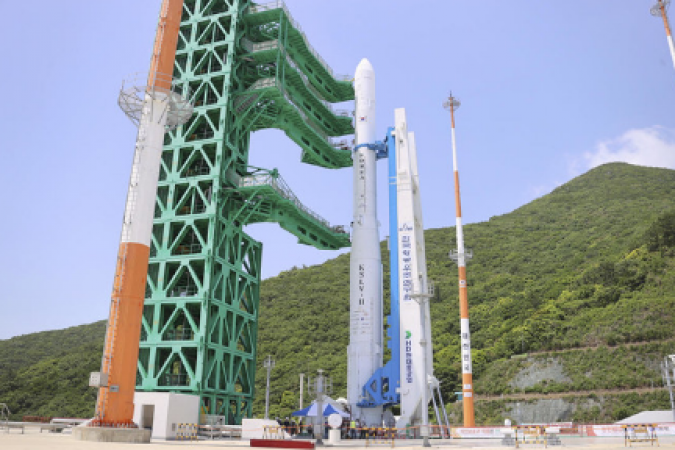
Seoul: On Wednesday, rival North Korea moved closer to launching its first military spy satellite into orbit as South Korea prepared to launch its first commercial-grade satellite.
Under the nation's space development programme, a domestically produced rocket will launch the South Korean satellite. Officials in Seoul claim that the launch has no military intent, but many experts believe that it will eventually enable South Korea to acquire the skills and technologies needed to run military satellite surveillance systems and create more potent missiles.
According to the Science Ministry, the Nuri space launch vehicle was slated to launch early Wednesday evening from a launch facility on a southern South Korean island, barring last-minute weather or other issues.
Also Read: A boost in funding is requested by the COP28 president-elect to combat climate change in Africa
The main satellite, known as "Next Generation Small Satellite 2," as well as seven additional smaller, cube-shaped satellites, are all carried on the rocket. According to a ministry statement, the primary one is responsible for confirming imaging radar technology and monitoring cosmic radiation in close-to-Earth orbit.
The launch on Wednesday marks the third of its kind for Nuri, South Korea's first indigenous rocket.
The rocket's dummy payload made it to the desired altitude during its first launch in 2021 but was unable to enter orbit. The Nuri rocket was primarily intended to be tested during South Korea's second attempt at launching a "performance verification satellite" into orbit last year. As of today, South Korea is the tenth country in the world to launch a satellite into orbit using its own technology.
The most recent launch occurs as military tensions on the Korean Peninsula are at an all-time high. In an effort to counter the escalation of military exercises between the US and South Korea, North Korea has tested more than 100 missiles since the year 2022, some of which are nuclear-capable weapons intended to strike South Korea and the US.
According to analysts, the North's testing binge was probably intended to put pressure on its adversaries to reduce their military training and ease economic sanctions against the North.
Also Read: One of the war's most serious cross-border attacks was allegedly repelled by Russia
At the nation's aerospace facility on May 16, North Korean leader Kim Jong Un reviewed a completed military spy satellite and gave his approval to an unnamed future action plan regarding its launch.
Kim pledged to strengthen the nation's defence during the visit and cited the strategic value of a spy satellite as "US imperialists and (South) Korean puppet villains escalate their confrontational moves," according to state media.
According to some experts, the spy satellite North Korea revealed through its state media doesn't seem to be sufficiently advanced to produce high-resolution imagery that can significantly increase the nation's surveillance capabilities.
However, Lee Choon Geun, an honorary research fellow at the Science and Technology Policy Institute of South Korea, claimed that it is still likely that the North Korean satellite will be able to keep track of the deployment of incoming US strategic assets like an aircraft carrier as well as the movements of South Korean warships and fighter jets.
In Lee's opinion, having such a satellite would be preferable to not having one.
Lee predicted North Korea would try to launch several more satellites into space after launching its first spy satellite, most likely more sophisticated ones. North Korea could virtually have real-time monitoring of the Korean Peninsula with three to five satellites, he claimed.
According to Lee, the North may launch its first spy satellite in June. According to other experts, the launch is more likely to take place in the second half of this year.
The recent North Korean push for a spy satellite launch, according to Jung Chang Wook, head of the Korea Defence Study Forum think tank in Seoul, suggests that it is very concerned about the South Korean satellite launch programme.
North Korea's satellite launch would be illegal under United Nations Security Council resolutions, which forbid the nation from engaging in any kind of ballistic launch, unlike satellite launches by South Korea and other nations.
Because ballistic missiles and space launch vehicles frequently share similar bodies, engines, and other components, the UN saw the North's earlier launches of Earth observation satellites as a cloaked test of its long-range missile technology.
Currently lacking its own military reconnaissance satellites, South Korea relies on US spy satellites to keep an eye on North Korea's strategic installations. Soon, South Korea hopes to launch its own constellation of spy satellites.
Despite not having been created primarily for military use, the South Korean satellite scheduled for launch on Wednesday will still provide the country with technologies useful in the creation of intercontinental ballistic missiles and military spy satellites, according to Jung.
It just depends on how we describe launches publicly. There is no justification to unnecessarily incite our neighbours, according to Jung.
South Korea already possesses missiles that can reach every part of North Korea. However, Jung argued that South Korea needs longer-range missiles to be ready for potential security threats from rivals like China and Russia in the future.
Also Read: Greek PM: Migration "pushback" investigation is underway
Lee claimed that because the Nuri rocket uses a type of liquid fuel that takes much longer to refuel than solid fuel, using it as a missile isn't strategically significant.
However, given that South Korea's commercial-grade satellite will be launched into a sun-synchronous orbit, which is typically used by reconnaissance satellites, he claimed there is a "enough possibility" that the launch will aid its efforts to develop a space-based surveillance system